区别时态-(一般现在时,一般过去时,一般将来时)
一般现在时、现在进行时、一般过去时及一般将来时四种时态语言点归纳总结
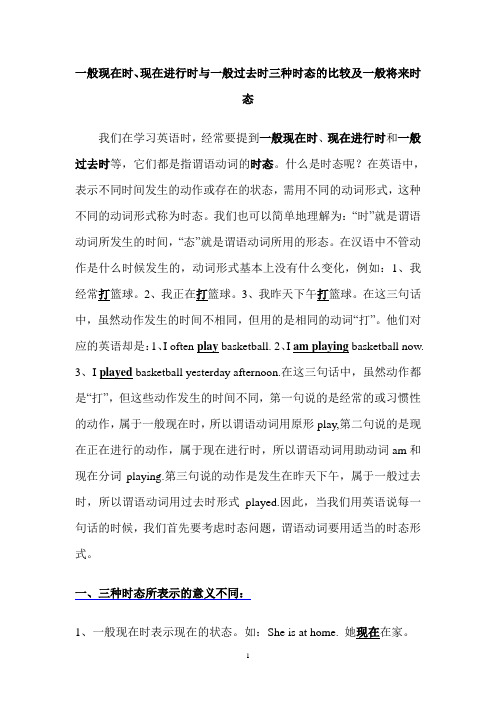
一般现在时、现在进行时与一般过去时三种时态的比较及一般将来时态我们在学习英语时,经常要提到一般现在时、现在进行时和一般过去时等,它们都是指谓语动词的时态。
什么是时态呢?在英语中,表示不同时间发生的动作或存在的状态,需用不同的动词形式,这种不同的动词形式称为时态。
我们也可以简单地理解为:“时”就是谓语动词所发生的时间,“态”就是谓语动词所用的形态。
在汉语中不管动作是什么时候发生的,动词形式基本上没有什么变化,例如:1、我经常打篮球。
2、我正在打篮球。
3、我昨天下午打篮球。
在这三句话中,虽然动作发生的时间不相同,但用的是相同的动词“打”。
他们对应的英语却是:1、I often play basketball. 2、I am playing basketball now.3、I played basketball yesterday afternoon.在这三句话中,虽然动作都是“打”,但这些动作发生的时间不同,第一句说的是经常的或习惯性的动作,属于一般现在时,所以谓语动词用原形play,第二句说的是现在正在进行的动作,属于现在进行时,所以谓语动词用助动词am和现在分词playing.第三句说的动作是发生在昨天下午,属于一般过去时,所以谓语动词用过去时形式played.因此,当我们用英语说每一句话的时候,我们首先要考虑时态问题,谓语动词要用适当的时态形式。
一、三种时态所表示的意义不同:1、一般现在时表示现在的状态。
如:She is at home. 她现在在家。
一般现在时也表示经常的或习惯性的动作。
如:He often plays basketball.他时常打篮球。
2、现在进行时表示现在进行时表示现在(说话瞬间)正在进行或发生的动作。
如:He is playing basketball now.他正在打篮球。
3、一般过去时表示表示过去某个时间存在的状态。
如:She was at home yesterday.她昨天在家。
(完整版)一般现在时、现在进行时、一般将来时、一般过去时四大时态讲解表格对比总结
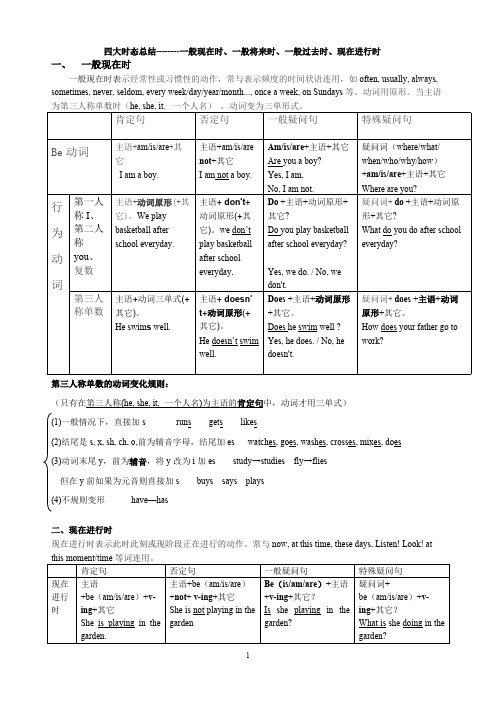
四大时态总结--------一般现在时、一般将来时、一般过去时、现在进行时一、一般现在时一般现在时表示经常性或习惯性的动作,常与表示频度的时间状语连用,如often, usually, always, sometimes, never, seldom, every week/day/year/month..., once a week, on Sundays等。
动词用原形。
当主语为第三人称单数时(he, she, it, 一个人名),动词变为三单形式。
肯定句否定句一般疑问句特殊疑问句Be动词主语+am/is/are+其它I am a boy.主语+am/is/arenot+其它I am not a boy.Am/is/are+主语+其它Are you a boy?Yes, I am.No, I am not.疑问词(where/what/when/who/why/how)+am/is/are+主语+其它Where are you?第一人称I、第二人称you、复数主语+动词原形(+其它)。
We playbasketball afterschool everyday.主语+ don't+动词原形(+其它)。
we don’tplay basketballafter schooleveryday.Do +主语+动词原形+其它?Do you play basketballafter school everyday?Yes, we do. / No, wedon't.疑问词+do +主语+动词原形+其它?What do you do after schooleveryday?行为动词第三人称单数主语+动词三单式(+其它)。
He swim s well.主语+ doesn’t+动词原形(+其它)。
He doesn’t swimwell.Does +主语+动词原形+其它。
Does he swim well ?Yes, he does. / No, hedoesn't.疑问词+ does +主语+动词原形+其它。
一般现在时态,现在进行时,一般过去时,一般将来时,现在完成时

一般现在时态,现在进行时,一般过去时,一般将来时,现在完成时一般现在时态,现在进行时,一般过去时,一般将来时,现在完成时话题:时态动词教育学习一.一般现在时用动词原形表示,但单数第三人称后要加-S,在词尾加-s 时要注意:1( 一般情况:加-s 例,reads,writes,says2( 以s,x,ch,sh收尾的词加-es 例:teaches,washes,guesses3( 以辅音字母,y结尾的词变y为I 再加-es 例:try-tries。
Carry-carries。
这个时态的疑问句一般以句首加助动词do,does构成。
句中动词要用原形动词be提前:Do you know it,Are you students,Does she have a pen,1( 一般现在时表示经常性或习惯性的动作:We always carefor each other and help each other.They cycle to work everyday.2( 现在特征或状态:He loves sports.Do you sing? A little.I major in English.3(遍真理Light travels faster than sound.Two and four makes six.The moon moves round see the earth.有些表示状态和感觉的动词常常可用于一般现在时:be love likehate want hope need prefer wish know understand remember believe recognize guess suppose mean belong think feel envydoubt remain consist contain seem look see fit suit owe own hear find suggest propose allow show prove mind have sound taste matter require possess desire等等。
八大时态讲解

一般将来时的注意点:
be going to 与 will /shall区别: be going to 指当前的、已计划过或思考过的意图 和打算;
如:I am going to listen to music. (我打算听音乐 )
will /shall 表示未事先思考或为计划过的意图 如:It will be Christmas soon .(很快就圣诞节了 )
3.一般将来时态(The Simple Future Tense)
概念:表示将来某个时间要发生的动作或存
在的状态
谓语动词形式
:12..
will/shall+do am/is/are going
to+do
3. am/is/are + doing
常用时间状语 :
tomorrow, in three days,this…,
• 将来完成时: We will have had our exam by September 20.
• 过去将来完成时: He told them he would have finished by 9 o’clock.
英语的动词时态(完成进行)
• 现在完成进行时: Obviously she’s been crying. It has been snowing all night. The ground is covered with thick snow.
• 一般将来时: We will have a test next month. He is going to buy her some flowers.
• 一般过去将来时: He was sixty-eight. In two years he would be seventy. I knew you would agree.
区别时态:(一般现在时、一般过去时、一般将来时)

一般体三种时态区别:(一)一般体三种时态综合练习:(一)1. _____ he _____ to the park at 6:30 in the morning? No,he _____ .A. Does; goes; doesB. Does; go; doesn’tC. Does; go; does2. What colour _____ you _____ this bookcase? I _____ it pink.A. are; going to paint; am going to paintB. do; paint; paintC. did; paint; painted3. Tim always _____ a picture at home. He _____ a car now.A. draws; is drawingB. draw; drawC. draws; draw4. She usually _____ her friends. They often _____ tea.A. see; drinkB. sees; drinksC. sees; drink5. He usually _____ the dishes at night, but tonight he _____ clothes.A. wash; washB.washes; is going to washC. is washing; washes6. Mr. Green usually _____ his newspaper in the evening, but he and his wife _____ television yesterday evening.A.reads; watchesB.reads; is going to watchC.reads; watched7. Where are the man and the woman? They _____ near the tree.A. sitB. satC. are sitting8. _____ your pen pal _____ diving? No, he _____ .He ______ writing stories.A. D oes; like; doesn’t; likesB.Does; likes; doesn’t; likeC.Do; like; don’t;likes9. _____ you _____ fishing yesterday? No, we _____ .A. Does; go; doesn’tB. Did; go; didn’tC. Do; go; don’t10. Open the window, Please. Look! He _____ it.A. opensB. is openningC. is opening11. I usually _____ some milk every day. But I _____ coffee yesterday.A. drink; drankB. is drinking; drinkC. drank; am drinking12. Mr. Green often __ his newspapers at night. But he ___ an interesting booktonight.A. reads; readsB. reads; readC. reads; is going to read13. The old man _____ playing sports in the park. He _____ morning exercise now.A. likes; is doingB. likes; doesC. like; doing14. What _____ you usually _____ in the evening? I ______ computer games.What _____ you _____ last night? I _____ a book.A. do; do; play; did; do; readB. did; do; played; do; do; readC. does; do; plays; do; do; am reading15. Where ______ the boy _____ ? He _____ across the river now.A. does; swim; swimsB. is; swimming; is swimmingC. is; swimming; is swimming16. _____ you _____ to music now? Yes, we _____ .A. Do; listen; doB. Did; listen; didC. Are; listening; are17. Put on you coat, please. OK. I ___ it on.A. am puttingB. am going to putC. Put18. _____ you ______ coffee? Yes, I ______ .A. Do; like; doB. Did; like; didC. Are; like; am19. Look! Two cats ______ across the wall.A. runB. runsC. are running20. She ____ tea, but he ___ .A. likes; doesn’t B; like; don’t C. like; doesn’t21. ---How many ________ in the tree? ---There are two.A. bird are therB. birds is therC. birds are thereD.birds are their22.. Mr Johnson usually goes to the hospital ________.A. by his carB. by the black carC. by carD. by the new car23. Does your brother play ping-pong __________?A. on every afternoonB. every afternoonC. in every afternoonD. at every afternoon24. ________ do you usually come to school?A. HowB. WhatC. WhichD. How much25. ---Don’t you usually come to school by bike? ---_________. But I sometimes walk.A. Yes, I doB. No, I don’tC. Yes, I doD. No, I don’t26. What ____ Tom and his mother like ?A. doesB. doC. isD. are27. What’s your hobby? My hobby is ______ model plane.A. makingB. makeC. makingD. made28. ---Did you go to the park on Sunday morning? ---___, I went there in the afternoon.A. YesB. NoC. SureD. Sorry29. I don’t think he’s so great, but my mom _________.A. doB. doesC. isD. are30. A kid ______ breakfast every morning, because it’s good for his health.A. have toB. has toC. has to haveD. has to has一般体三种时态综合练习:(二)1.Listen ! Someone ______ in the room.A. criedB. cryingC. is crying2.Could you tell me where the bus station______?A. wasB. isC. be3.He often ______ his clothes on Sundays.A. washingB. washesC. wash4.I’m Chinese. Where ______ from?A. do you comeB. you are comingC. you comeD. are you coming5.Don’t talk so loudly . Your father ______.A. sleepsB. is sleepingC. sleptst week John ______ his leg.A. brokenB. brokeC. breaks7.——Can I speak to Mr. Green?——I’m afraid not. He __________a meeting at the moment.A. havingB. is havingC. hasD. had8.——What are the old men under the tree doing?——They ______________ happily.A. is chatingB. is chattingC. are chatingD. are chatting9. My father _______ the Party twenty years ago.A. joinB. joinsC. joinedD. will join10. Gina often ________her homework in the evening. But at the moment this evening she________ TV.A. does; watchesB. is doing; is watchingC. does; is watchingD. is doing; watches11. He _________ to school on Sundays.A. don’t goB. doesn’t goC. isn’t goD. not go12. He sometimes _________ some novels on Sunday.A. seeB. readsC. watchesD. look13. My father _______ to work at eight.A. usually goB. usually goesC. goes usuallyD. go usually14. Jenny ____ in an office. Her parents ____in a hospital.A. work works B works workC. work are workingD. is working work15. He said the sun ____in the east and ____in the west.A rose; setB rises; setsC rises; setD rise; sets16. Wang Mei ____ music and often ____ to music.A like; listenB likes; listensC like; are listeningD liking ; listen17. Jenny____ English every evening.A has studyB studiesC studyD studied18. Every year many foreigners _________to China to learn Chinese.A. have comeB. comesC. cameD. come19.——Where’s Susan, Mike?——She _________ in the kitchen.A. cooksB. cookedC. is cooking20.——What’s your brother doing in his room now?——He ____________ a kite.A. makesB. madeC. is makingD. will make21. Yesterday,Tony’s family _________ a good time.A. hasB. haveC. hadD. haven’t22.——Where’s t he cake I made this morning?——We _______ it, mum. Can you make another one for us?A. ateB. eatC. will itD. were eating23. Mary___________ the piano well.A. playB. playsC. playingD. played24. Don’t turn off the radio. I _______ to the news.A. listenB. have listenedC. listenedD. am listening25. Don’t turn on the TV. Grandma ____________ now.A. is sleepingB. will sleepC. sleptD. sleeps26.——What are you doing, Cathy?——I’m __________my cat.I can’t find it.A. looking forB. looking atC. looking upD. looking after27.——What did you do after school yesterday?——I _________basketball with my friends.A. playB. playedC. will playD. am playing28. ---Hi, Kate. You look tired. What’s the matter?---I ______well last night.A. didn’t sleepB. don’t sleepC. haven’t sleptD. won’t sleep29.Look!The twins_____their mother do the housework.(A)are wanting (B)help(C)are helping (D)are looking30._____are the birds doing? They are singing in a tree.(A)Who (B)What (C)How (D)Where31.Is she____something?(A)eat (B)eating (C)eatting (D)eats32.你在干什么?(A)What is you doing? (B)What are you do?(C)What are you doing? (D)What do you do?33.What are you listening_____?(A)/ (B)for (C)at (D)to34.我正在听他说话.(A)I listening to him. (B)I'm listening to him.C)I'm listen to him. (D)I'm listening him.35.They are_____their clothes.(A)makeing (B)putting (C)put away (D)putting on36.Listen! She____in the classroom.(A)is singing (B)sing (C)to sing (D)is sing37.The children_____football.(A)is playing (B)are playing (C)play the (D)play 38.They are flying kites.(A)他们喜欢放风筝. (B)他们在放风筝吗?(C)他们在放风筝. (D)他们常放风筝.39.Look,They are swimming in the river.I want_____you.(A)to go with (B)go with (C)helping (D)help40.Look.Lucy is_____a new bike today.(A)jumping (B)running (C)riding (D)takeing41. _____ you have a book?A. DoB. AreC. IsD. Have42. They _________ on a farm.A. workingB. is workC. workD. is worked43. Does Peter like to watch TV?__________.A. Yes, he likeB. No, he doesn’tC. Yes, he’d likeD. No, he likes44. She doesn’t __________ her homework in the afternoon.A. doingB. to doC. doesD. do45. How ____________ Mr. Brown ___________ to America?A. do,goB. is,goC. does,goD. does,goes46. Where’s my camera? I____________ it.A. am not findingB. am not seeingC. can’t findD. can’t look at47. How ___________ he go to work?He ___________ to work by bike.A. does ;goB. do;goesC. do ;goD. does;goes48. ______ you usually late for school?No, _____________.A. Do ; I amB. Does ;notC. Are ; I’m notD. Are ; I aren’t49. _____ she _____ home at six every day?A. Is , leaveB. Does , leaveC. Is , leavesD. Does , left50. Mr. Yang ____________ English this term.A. teaches ourB. teaches usC. teachs usD. teach our51. _____Mike from Japan?A. AreB. DoC. DoesD.Is52. _____you come from Japan?A. AreB. DoC. DoesD.Is53. What language do you_______?A. sayB. talkC. tellD. speak54. They ________ an English evening next Sunday.A. are havingB. are going to haveC. will havingD. is going to have55. ________ your brother ________ a magazine from the library?A. Are; going to borrowB. Is; going to borrowC. Will; borrowsD. Are; going to borrows56. _____ he _____ to the park at 6:30 in the morning? No, he ____.A. Does; goes; doesB. Does; go; doesn’tC. Does; go; does57. What colour _____ you _____ this bookcase? I _____ it pink.A. are; going to paint; am going to paintB. do; paint; paintC. did;paint; painted58. Tim always _____ a picture at home. He _____ a car now.A. draws; is drawingB. draw; drawC. draws; draw59. She usually _____ her friends. They often _____ tea.A. see; drinkB. sees; drinksC. sees; drink60. He usually _____ the dishes at night, but tonight he _____ clothes.A. wash; washB. washes; is going to washC. is washing; washes61. Mr. Green usually _____ his newspaper in the evening, but he and his wife _____ television yesterday evening.A. reads; watchesB. reads; is going to watchC. reads; watched62. Where are the man and the woman? They _____ near the tree. A. sit B. satC. are sitting63. _____ your pen pal _____ diving? No, he _____ .He ______ writing stories.A. Does; like; doesn’t; likes B.Does; likes; doesn’t; like C. Do; like; don’t; likes64. _____ you _____ fishing yesterday? No, we _____ .A. Does; go; doesn’tB. Did; go; didn’tC. Do; go; don’t65. Open the window, please. Look! He _____ itA. opensB. is openningC. is opening66. I usually _____ some milk every day. But I _____ coffee yesterday.A. drink; drankB. is drinking; drinkC. drank; am drinking67. Mr. Green often _____ his newspapers at night. But he _____ an interesting book tonight.A. reads; readsB. reads; readC. reads; is going to read68. The old man _____ playing sports in the park. He _____ morning exercise now.A. likes; is doingB. likes; doesC. like; doing69. What _____ you usually _____ in the evening? I ______ computer games.What _____ you _____ last night? I _____ a book.A. do; do; playB. did; do; playedC. does; do; playsdid; do; read do; do; read do; do; am reading70. Where ______ the boy _____? He _____ across the river now.A. does; swim; swims B. is; swimming; is swimmingC. is; swimming; is swimming71. _____ you _____ to music now? Yes, we _____. A. Do; listen; do B. Did; listen; did C. Are; listening; are72. Put on you coat, please. OK. I ______ it on.A. am puttingB. am going to putC. put73. _____ you ______ coffee? Yes, I ______.A. Do; like; doB. Did; like; didC. Are; like; am74. Look! Two cats ______ across the wall.A. runB. runsC. are running75. She _____ tea, but he _____.A. likes; doesn’t B; like; don’t C. like; doesn’t76. If it ________ tomorrow, we’ll go roller-skating.A. isn’t rainB. won’t rainC. doesn’t rainD. doesn’t fine77. Jenny ____ in an office. Her parents ____in a hospitalA work; worksB works; workC work; are workingD is working; work78. ----I don’t know if his uncle _____.---- I think he _____ if it doesn’t rain.A will come; comesB will come; will comeC comes; comesD comes; will come80. There _____ a meeting tomorrow afternoon.A. will be going toB. will going to beC. is going to be三、按要求变换句型。
小学英语的四种时态知识点
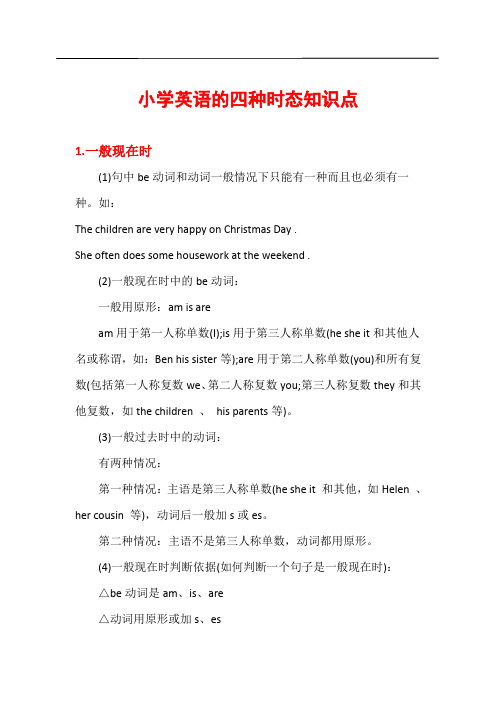
小学英语的四种时态知识点1.一般现在时(1)句中be动词和动词一般情况下只能有一种而且也必须有一种。
如:The children are very happy on Christmas Day .She often does some housework at the weekend .(2)一般现在时中的be动词:一般用原形:am is aream用于第一人称单数(I);is用于第三人称单数(he she it和其他人名或称谓,如:Ben his sister等);are用于第二人称单数(you)和所有复数(包括第一人称复数we、第二人称复数you;第三人称复数they和其他复数,如the children 、his parents等)。
(3)一般过去时中的动词:有两种情况:第一种情况:主语是第三人称单数(he she it 和其他,如Helen 、her cousin 等),动词后一般加s或es。
第二种情况:主语不是第三人称单数,动词都用原形。
(4)一般现在时判断依据(如何判断一个句子是一般现在时):△be动词是am、is、are△动词用原形或加s、es△没有时间状语或有usually、often、everyday、sometimes等不是具体的时间(5)有用的的依据:Be动词是is、am ←→名词用原形(这里包括可数名词的单数和不可数名词)Be动词是are ←→名词加s或es动词加s或es ←→主语是第三人称单数动词用原形←→主语不是第三人称单数(6)情态动词:我们现在学过的情态动词有:can、must、should、would。
情态动词后动词总是用原形。
(不受其他任何条件影响)2.一般过去时(1)句中be动词和动词一般情况下只能有一种而且也必须有一种。
如:The girls were on the grass just now .They visited my parents last weekend .(2)一般过去时中的be动词:一般用过去式:was werewas用于第一人称单数(I)和第三人称单数(he she it和其他人名或称谓,如:Ben 、his sister等);were用于第二人称单数(you)和所有复数(包括第一人称复数we、第二人称复数you;第三人称复数they 和其他复数,如the children 、his parents等)。
一般过去时-一般现在时-一般将来时课件

表示经常或者反复发生的动作
信息词:
often(经Байду номын сангаас)
sometimes(有时)
always(总是)
usually(通常)
every day(每天)
every week(每周)
every month(每月) every term(每学期)
every year(每年)
一般将来时
常用形式:
be going to+动词原形 will+动词原形
“be going to”和“will”的区别:
• “be going to + 动词原形”表示打算或计 划将来要做的事
• “will+动词原形”表示将要发生的动作或 存在的状态,或表示一种愿望。
• 在I think, I hope等后面的从句一般用will 来表示将要做或将要发生的事情。
1. Do you often play football after school? (肯定回答) Yes . I do .
2. I have many books. (改为否定句) I don’t have many books.
3. His sister likes playing table tennis (改为否定句) His sister doesn’t like playing table tennis.
The end
Thank you!
一般过去时:Past Simple
表示过去发生的动作或存在的状态
常用时 间
常与一般过去时态连用的时间有:
yesterday
yesterday morning (afternoon, evening…)
英语9大时态和时间标志词

英语9大时态和时间标志词英语中有九种主要的时态,它们是:1. 一般现在时(Simple Present):-时间标志词:always, usually, often, sometimes, every day, once a week, etc.2. 一般过去时(Simple Past):-时间标志词:yesterday, last week, two days ago, in 1990, etc.3. 一般将来时(Simple Future):-时间标志词:tomorrow, next week, in the future, soon, etc.4. 现在进行时(Present Continuous):-时间标志词:now, at the moment, currently, today, etc.5. 过去进行时(Past Continuous):-时间标志词:while, when, at 5 o'clock yesterday, etc.6. 将来进行时(Future Continuous):-时间标志词:at this time tomorrow, in an hour, etc.7. 现在完成时(Present Perfect):-时间标志词:since, for, just, already, yet, ever, never, recently, etc.8. 过去完成时(Past Perfect):-时间标志词:before, after, by the time, by, until, etc.9. 将来完成时(Future Perfect):-时间标志词:by the time, before, by, in, etc.请注意,这些时间标志词并不是绝对的,有时它们可能会在多个时态中使用,具体使用时要根据句子语境来判断。
六种时态区分
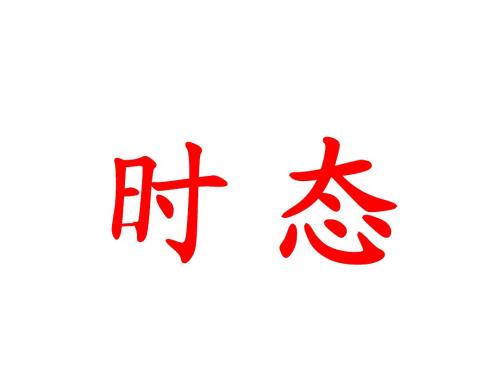
过去进行时的注意点: 过去进行时的注意点
1. When my father got home, I _____ a letter to my friend. (2008宁波中考 宁波中考) 宁波中考 A.write B. am writing
C. wrote D. was writing 2. While Jim was making a paper plane , was doing his brother ____________homework.(do) 引导的时间状语从句中, 在when , while引导的时间状语从句中 表示 引导的时间状语从句中 主从句中两个动作同时发生时, 主从句中两个动作同时发生时 用过去进行 时表示___________________8衢州中考 衢州中考) 衢州中考 --- Why didn’t you come and open the door for me, dear? --- Sorry, Jack. I ______ in the kitchen and didn’t hear you. A.was cooking C. wave cooked B. am cooking D. will cook
16种英语时态的讲解
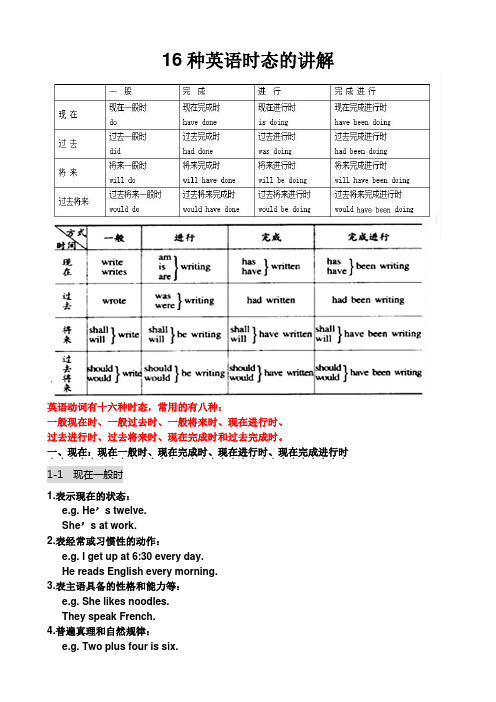
16种英语时态的讲解英语动词有十六种时态,常用的有八种:一般现在时、一般过去时、一般将来时、现在进行时、过去进行时、过去将来时、现在完成时和过去完成时。
一、现在:现在一般时、现在完成时、现在进行时、现在完成进行时..............................1-1 现在一般时1.表示现在的状态:e.g. He’s twelve.She’s at work.2.表经常或习惯性的动作:e.g. I get up at 6:30 every day.He reads English every morning.3.表主语具备的性格和能力等:e.g. She likes noodles.They speak French.4.普遍真理和自然规律:e.g. Two plus four is six.The moon goes around the earth.一般动词:主语是第一人称单复数时,没有变化;主语是第三人称时,动词+s,以sh /ch/ s/x /z/ o 加es,以y结尾的,前面是元音字母的直接加es,前面是辅音字母的,把y改i加es。
1-2 现在完成时现在完成时构成: have/has + 动词的过去分词1.定义:现在完成时表示到目前为止已经完成,并对现在留下某种后果和影响的动作。
1.表示过去发生的某一动作对现在造成的影响或结果,常与一些时间状语2.表示过去发生的动作或存在的状态,一直持续到现在,也许还将继续下去,可以和表示从过去某一时刻延续到现在的一段时间的状语连用如:already已经,早以, yet仍然,还, ever曾经, never从不;决不,从未,从来没有, just 刚刚,仅仅, before在···之前, once一次,曾经,twice两次,两倍,等连用,也可以和包括现在在内的时间状语,如these days,today,this year,so far(目前,到目前为止)等连用.即for +时间段,since(自从)+时间点/从句, in the last ten years等,谓语只可用延续性动词.2. has/have been to 去过某地表示某人的一种经历,可与once,twice,already,ever,never,等连用。
初中英语六大时态

初中英语六大时态一.一般现在时二.一般过去时三.一般将来时四.现在进行时五.过去进行时六.现在完成时一、一般现在时1.表示现阶段经常性、习惯性的动作或存在的状态,特征;常用时间状语:always (总是) usually (常常) often (经常) sometimes (有时) seldom (很少,少到可忽略不计) never (从不) every day (每天)/week (每周),等「注:seldom 与never 都是否定用法」例句:I always go to school by bus in order to get to the class on time.为了准时去上课,我总是坐公交车上学 He seldom does his homework which make his teacher so mad.他几乎不做作业,这让他的老师非常恼火(※注:主语为第三人称时动词的变化 go →goes )2.在时间状语和条件状语从句中,用一般现在时表将来例句:If you don ’t harry up,you will be late !time 2 1 3如果你不快一点就要迟到啦!You mustn’t eat any thing until you go to hospital.你不能吃任何东西直到你去看医生后「※注:其实就是“主将从现”」3.表示客观真理和事实的时候用一般现在时例句:The sun rises in the east.太阳从东边升起The earth moved around the sun.地球围着太阳转4.begin、come、go、leave、start、arrive等动词常用一般现在时表示按规定按计划将要发生的动作例句:Class begins at 8 in the morning.8点开始上课二、一般过去时1.一般过去时表示过去某时间发生的动作、存在的状态或过去反复发生的动作。
如何区分英语时态

如何区分英语时态英语时态是学习英语的重点,可是如何区分英语时态却难倒了很多人。
下面是店铺为你整理的区分英语时态的方法,希望大家喜欢! 区分英语时态的方法英语时态分为16种:一般现在、一般过去、一般将来、过去将来时,以及这四者的进行时、完成时和完成进行时。
1. 一般现在时用法:A) 表示现在发生的动作、情况、状态和特征。
B) 习惯用语。
C) 经常性、习惯性动作。
例:He always helps others. (他总是帮助别人。
)D) 客观事实和普遍真理。
尤其要注意,如果前后文不是一般现在时,则无法保持主句、从句时态一致。
E) 表示一个按规定、计划或安排要发生的动作,(仅限于某些表示“来、去、动、停、开始、结束、继续”等的动词)可以与表示未来时间的状语搭配使用。
常见的用法是:飞机、火车、轮船、汽车等定期定点运行的交通方式。
How often does this shuttle bus run? (这班车多久一趟?)F) 在时间和条件状语从句里经常用一般现在(有时也用现在完成时)表示将来事情。
例:When you have finished the report, I will have waited for about 3 hours.(等你完成这份报告的时候,我就已经等了将近3个小时了。
)2. 现在进行时(be doing)用法:现在正在进行的动作。
3. 现在完成时(have done)用法:A) 表示动作到现在为止已经完成或刚刚完成。
B) 表示从过去某时刻开始,持续到现在的动作或情况,并且有可能会继续延续下去。
此时经常用延续性动词。
时间状语常用since加一个过去的时间点,或for加一段时间,或by加一个现在时间。
注意事项A) 现在完成时是联系过去和现在的纽带。
现在完成时和过去时的区别在于:现在完成时强调动作的动态,或受动态的影响,是动态的结果,对现在有影响;过去时只表示过去的某个具体时间里发生的动作,与现在没有联系。
七个时态
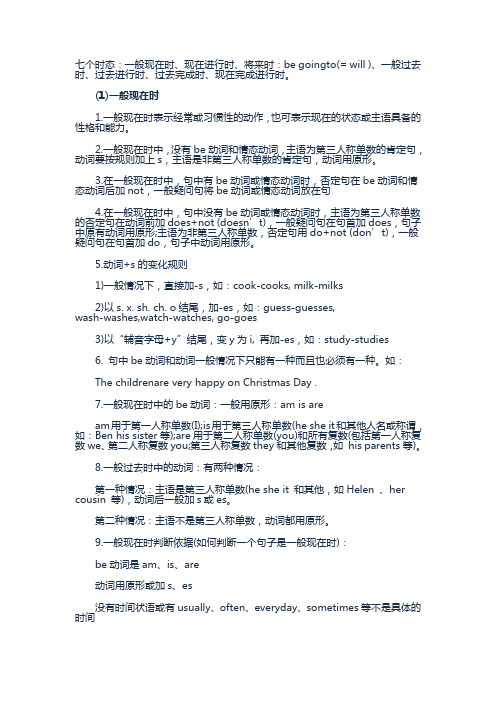
七个时态:一般现在时、现在进行时、将来时:be goingto(= will )、一般过去时、过去进行时、过去完成时、现在完成进行时。
(1)一般现在时1.一般现在时表示经常或习惯性的动作,也可表示现在的状态或主语具备的性格和能力。
2.一般现在时中,没有be动词和情态动词,主语为第三人称单数的肯定句,动词要按规则加上s,主语是非第三人称单数的肯定句,动词用原形。
3.在一般现在时中,句中有be动词或情态动词时,否定句在be动词和情态动词后加not,一般疑问句将be动词或情态动词放在句4.在一般现在时中,句中没有be动词或情态动词时,主语为第三人称单数的否定句在动词前加does+not (doesn’t),一般疑问句在句首加does,句子中原有动词用原形;主语为非第三人称单数,否定句用do+not (don’t),一般疑问句在句首加do,句子中动词用原形。
5.动词+s的变化规则1)一般情况下,直接加-s,如:cook-cooks, milk-milks2)以s. x. sh. ch. o结尾,加-es,如:guess-guesses,wash-washes,watch-watches, go-goes3)以“辅音字母+y”结尾,变y为i, 再加-es,如:study-studies6. 句中be动词和动词一般情况下只能有一种而且也必须有一种。
如:The childrenare very happy on Christmas Day .7.一般现在时中的be动词:一般用原形:am is aream用于第一人称单数(I);is用于第三人称单数(he she it和其他人名或称谓,如:Ben his sister等);are用于第二人称单数(you)和所有复数(包括第一人称复数we、第二人称复数you;第三人称复数they和其他复数,如his parents等)。
8.一般过去时中的动词:有两种情况:第一种情况:主语是第三人称单数(he she it 和其他,如Helen 、her cousin 等),动词后一般加s或es。
初中英语语法:一般现在时、一般过去时和一般将来时
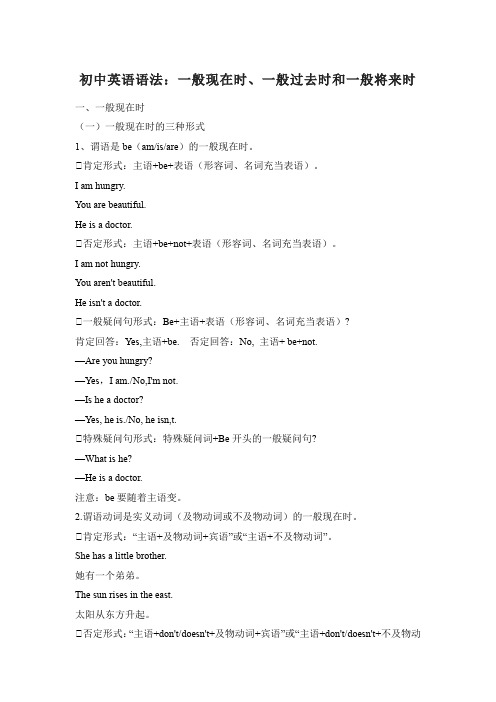
初中英语语法:一般现在时、一般过去时和一般将来时一、一般现在时(一)一般现在时的三种形式1、谓语是be(am/is/are)的一般现在时。
①肯定形式:主语+be+表语(形容词、名词充当表语)。
I am hungry.You are beautiful.He is a doctor.①否定形式:主语+be+not+表语(形容词、名词充当表语)。
I am not hungry.You aren't beautiful.He isn't a doctor.①一般疑问句形式:Be+主语+表语(形容词、名词充当表语)?肯定回答:Yes,主语+be. 否定回答:No, 主语+ be+not.—Are you hungry?—Yes,I am./No,I'm not.—Is he a doctor?—Yes, he is./No, he isn,t.①特殊疑问句形式:特殊疑问词+Be开头的一般疑问句?—What is he?—He is a doctor.注意:be要随着主语变。
2.谓语动词是实义动词(及物动词或不及物动词)的一般现在时。
①肯定形式:“主语+及物动词+宾语”或“主语+不及物动词”。
She has a little brother.她有一个弟弟。
The sun rises in the east.太阳从东方升起。
①否定形式:“主语+don't/doesn't+及物动词+宾语”或“主语+don't/doesn't+不及物动词”。
She doesn't have a little brother.她没有弟弟。
I don't eat every morning.我每天早晨都不吃饭。
①一般疑问句形式:“Do/Does+主语+及物动词原形+宾语”或“Do/Does+主语+不及物动词原形”。
肯定回答:Yes,主语+do/does. 否定回答是:No, 主语+ don't/doesn't.—Do you eat every morning?—Yes, I do./No, I don't.—Does she have a little brother?—Yes, she does./No, she doesn't.①特殊疑问句:特殊疑问词+do/does开头的一般疑问句?What do you like?When do you go to school?注意:根据主语确定用do还是does。
人教版小学英语语法--时态总结(一般现在时-一般过去式-现在进行时-一般将来时)
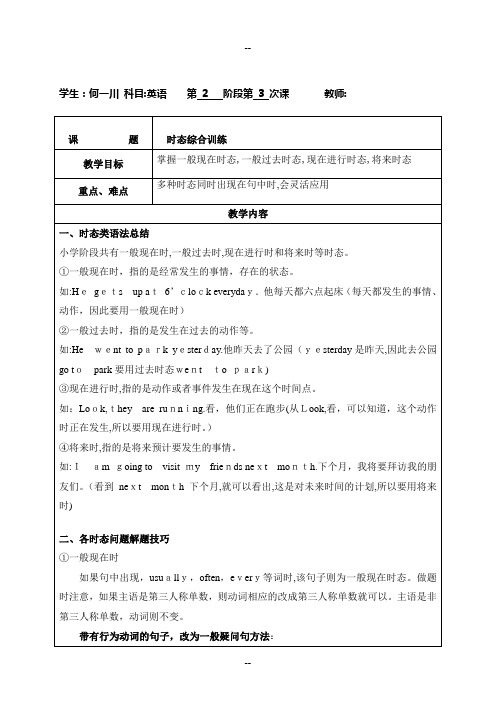
课题
时态综合训练
教学ห้องสมุดไป่ตู้标
掌握一般现在时态,一般过去时态,现在进行时态,将来时态
重点、难点
多种时态同时出现在句中时,会灵活应用
教学内容
一、时态类语法总结
小学阶段共有一般现在时,一般过去时,现在进行时和将来时等时态。
①一般现在时,指的是经常发生的事情,存在的状态。
②一般过去时
如果句中出现,lastweek/lastweekend/lastmonth/last year;yesterday,theday before yesterday,Xdays ago(其中,last是“上一......”d的意思,ago是“...前”的意思)等词时,该句子则为一般过去时态。做题时,只要把动词,改成过去时态。关键是记忆总结不规则动词的过去式。如:go---went,do---did,swim--swam
10.____she goingto schoolon foot?
选择最佳答案,并将序号填入题前括号中。
()1.HowMikegotoschool every day?
A.doB.isC.doesD.are
()2.The studentsthefootballmatchnow.
A.watchB.towatchC.are watchingD.watching
2.We _______(notwatch) TV on Monday.
3.Nick_______(not go) to the zooonSunday.
4.______they________(like) theWorldCup?
5.What _______theyoften _______(do) on Saturdays?
现在时﹑过去时﹑将来时﹑过去将来时

一般过去时一般过去时:简单地说是表示过去发生的动作或存在的状态。
我们首先来看看一般现在时的构成。
一般现在时的构成:a. be动词过去式的句式。
否定句是在was/were后面加not,was not (wasn't)/were not (weren't)。
一般疑问句是把was / were提前并放到句首,要求首字母要大写。
b.实义动词过去式的句式。
①肯定式:主语+动词过去式+其它。
如:They had a good time yesterday.②否定式:主语+did not(didn't)+动词原形+其它。
如:They didn't watch TV last night.③一般疑问句:Did+主语+动词原形+其它?肯定回答:Yes,主语+did.否定回答:No,主语+didn't.如:Did they have a meeting two days ago? Yes,they did. / No,they didn't.④特殊疑问句:特殊疑问词+did+主语+动词原形+其它?如:What time did you finish your homework?知道了一般现在时的构成,我们在看看在什么情况下,我们才能使用它。
一般过去时的用法:①一般过去时的基本用法a)表示过去某个特定时间发生的动作或存在的状态。
He suddenly fell ill yesterday.昨天他突然生病了。
The engine stopped because the fuel was used up.发动机因燃料用光而停机了。
b)表示过去经常发生的动作或存在的状态。
I wrote home once a week at college.我上大学时每周给家里写一封信。
He was already in the habit of reading widely in his boyhood.他童年时就养成了广泛阅读的习惯。
英语的几种时态
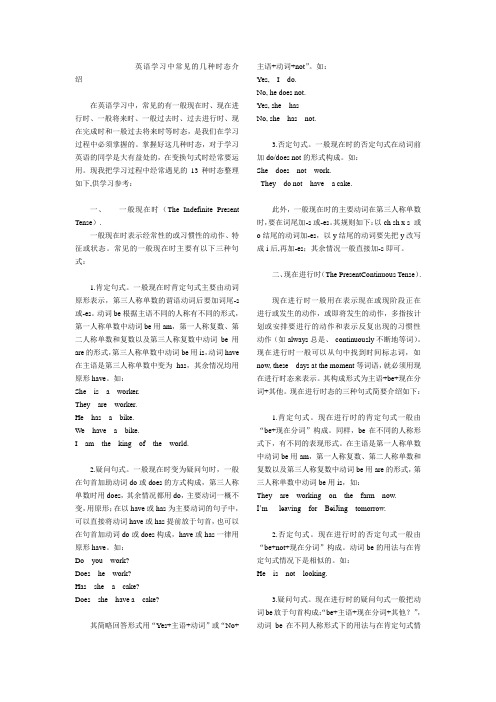
英语学习中常见的几种时态介绍在英语学习中,常见的有一般现在时、现在进行时、一般将来时、一般过去时、过去进行时、现在完成时和一般过去将来时等时态,是我们在学习过程中必须掌握的。
掌握好这几种时态,对于学习英语的同学是大有益处的,在变换句式时经常要运用。
现我把学习过程中经常遇见的13种时态整理如下,供学习参考:一、一般现在时(The Indefinite Present Tense).一般现在时表示经常性的或习惯性的动作、特征或状态。
常见的一般现在时主要有以下三种句式:1.肯定句式。
一般现在时肯定句式主要由动词原形表示,第三人称单数的谓语动词后要加词尾-s 或-es。
动词be根据主语不同的人称有不同的形式,第一人称单数中动词be用am,第一人称复数、第二人称单数和复数以及第三人称复数中动词be用are的形式,第三人称单数中动词be用is,动词have 在主语是第三人称单数中变为has,其余情况均用原形have。
如:She is a worker.They are worker.He has a bike.We have a bike.I am the king of the world.2.疑问句式。
一般现在时变为疑问句时,一般在句首加助动词do或does的方式构成,第三人称单数时用does,其余情况都用do,主要动词一概不变,用原形;在以have或has为主要动词的句子中,可以直接将动词have或has提前放于句首,也可以在句首加动词do或does构成,have或has一律用原形have。
如:Do you work?Does he work?Has she a cake?Does she have a cake?其简略回答形式用“Yes+主语+动词”或“No+主语+动词+not”。
如:Yes, I do.No, he does not.Yes, she hasNo, she has not.3.否定句式。
- 1、下载文档前请自行甄别文档内容的完整性,平台不提供额外的编辑、内容补充、找答案等附加服务。
- 2、"仅部分预览"的文档,不可在线预览部分如存在完整性等问题,可反馈申请退款(可完整预览的文档不适用该条件!)。
- 3、如文档侵犯您的权益,请联系客服反馈,我们会尽快为您处理(人工客服工作时间:9:00-18:30)。
一般体三种时态区别:(一)一般体三种时态综合练习:(一)1. _____ he _____ to the park at 6:30 in the morning? No,he _____ .A. Does; goes; doesB. Does; go; doesn’tC. Does; go; does2. What colour _____ you _____ this bookcase? I _____ it pink.A. are; going to paint; am going to paintB. do; paint; paintC. did; paint; painted3. Tim always _____ a picture at home. He _____ a car now.A. draws; is drawingB. draw; drawC. draws; draw4. She usually _____ her friends. They often _____ tea.A. see; drinkB. sees; drinksC. sees; drink5. He usually _____ the dishes at night, but tonight he _____ clothes.A. wash; washB.washes; is going to washC. is washing; washes6. Mr. Green usually _____ his newspaper in the evening, but he and his wife _____ television yesterday evening.A.reads; watchesB.reads; is going to watchC.reads; watched7. Where are the man and the woman? They _____ near the tree.A. sitB. satC. are sitting8. _____ your pen pal _____ diving? No, he _____ .He ______ writing stories.A. Does; like; doesn’t; likesB.Does; likes; doesn’t; likeC.Do; like; don’t;likes9. _____ you _____ fishing yesterday? No, we _____ .A. Does; go; doesn’tB. Did; go; didn’tC. Do; go; don’t10. Open the window, Please. Look! He _____ it.A. opensB. is openningC. is opening11. I usually _____ some milk every day. But I _____ coffee yesterday.A. drink; drankB. is drinking; drinkC. drank; am drinking12. Mr. Green often __ his newspapers at night. But he ___ an interesting booktonight.A. reads; readsB. reads; readC. reads; is going to read13. The old man _____ playing sports in the park. He _____ morning exercise now.A. likes; is doingB. likes; doesC. like; doing14. What _____ you usually _____ in the evening? I ______ computer games.What _____ you _____ last night? I _____ a book.A. do; do; play; did; do; readB. did; do; played; do; do; readC. does; do; plays; do; do; am reading15. Where ______ the boy _____ ? He _____ across the river now.A. does; swim; swimsB. is; swimming; is swimmingC. is; swimming; is swimming16. _____ you _____ to music now? Yes, we _____ .A. Do; listen; doB. Did; listen; didC. Are; listening; are17. Put on you coat, please. OK. I ___ it on.A. am puttingB. am going to putC. Put18. _____ you ______ coffee? Yes, I ______ .A. Do; like; doB. Did; like; didC. Are; like; am19. Look! Two cats ______ across the wall.A. runB. runsC. are running20. She ____ tea, but he ___ .A. likes; doesn’t B; like; don’t C. like; doesn’t21. ---How many ________ in the tree? ---There are two.A. bird are therB. birds is therC. birds are thereD.birds are their22.. Mr Johnson usually goes to the hospital ________.A. by his carB. by the black carC. by carD. by the new car23. Does your brother play ping-pong __________?A. on every afternoonB. every afternoonC. in every afternoonD. at every afternoon24. ________ do you usually come to school?A. HowB. WhatC. WhichD. How much25. ---Don’t you usually come to school by bike? ---_________. But I sometimes walk.A. Yes, I doB. No, I don’tC. Yes, I doD. No, I don’t26. What ____ Tom and his mother like ?A. doesB. doC. isD. are27. What’s your hobby? My hobby is ______ model plane.A. makingB. makeC. makingD. made28. ---Did you go to the park on Sunday morning? ---___, I went there in the afternoon.A. YesB. NoC. SureD. Sorry29. I don’t think he’s so great, but my mom _________.A. doB. doesC. isD. are30. A kid ______ breakfast every morning, because it’s good for his health.A. have toB. has toC. has to haveD. has to has一般体三种时态综合练习:(二)1.Listen ! Someone ______ in the room.A. criedB. cryingC. is crying2.Could you tell me where the bus station______?A. wasB. isC. be3.He often ______ his clothes on Sundays.A. washingB. washesC. wash4.I’m Chine se. Where ______ from?A. do you comeB. you are comingC. you comeD. are you coming5.Don’t talk so loudly . Your father ______.A. sleepsB. is sleepingC. sleptst week John ______ his leg.A. brokenB. brokeC. breaks7.——Can I speak to Mr. Green?——I’m afraid not. He __________a meeting at the moment.A. havingB. is havingC. hasD. had8.——What are the old men under the tree doing?——They ______________ happily.A. is chatingB. is chattingC. are chatingD. are chatting9. My father _______ the Party twenty years ago.A. joinB. joinsC. joinedD. will join10. Gina often ________her homework in the evening. But at the moment this evening she________ TV.A. does; watchesB. is doing; is watchingC. does; is watchingD. is doing; watches11. He _________ to school on Sundays.A. don’t goB. doesn’t goC. isn’t goD. not go12. He sometimes _________ some novels on Sunday.A. seeB. readsC. watchesD. look13. My father _______ to work at eight.A. usually goB. usually goesC. goes usuallyD. go usually14. Jenny ____ in an office. Her parents ____in a hospital.A. work works B works workC. work are workingD. is working work15. He said the sun ____in the east and ____in the west.A rose; setB rises; setsC rises; setD rise; sets16. Wang Mei ____ music and often ____ to music.A like; listenB likes; listensC like; are listeningD liking ; listen17. Jenny____ English every evening.A has studyB studiesC studyD studied18. Every year many foreigners _________to China to learn Chinese.A. have comeB. comesC. cameD. come19.——Where’s Susan, Mike?——She _________ in the kitchen.A. cooksB. cookedC. is cooking20.——What’s your brother doing in his room now?——He ____________ a kite.A. makesB. madeC. is makingD. will make21. Yesterday,Tony’s family _________ a good time.A. hasB. haveC. hadD. haven’t22.——Where’s the cake I made this morning?——We _______ it, mum. Can you make another one for us?A. ateB. eatC. will itD. were eating23. Mary___________ the piano well.A. playB. playsC. playingD. played24. Don’t turn off the radio. I _______ to the news.A. listenB. have listenedC. listenedD. am listening25. Don’t turn on the TV. Grandma ____________ now.A. is sleepingB. will sleepC. sleptD. sleeps26.——What are you doing, Cathy?——I’m __________my cat. I can’t find it.A. looking forB. looking atC. looking upD. looking after27.——What did you do after school yesterday?——I _________basketball with my friends.A. playB. playedC. will playD. am playing28. ---Hi, Kate. You look tired. What’s the matter?---I ______well last night.A. didn’t sleepB. don’t sleepC. haven’t sleptD. won’t sleep29.Look!The twins_____their mother do the housework.(A)are wanting (B)help(C)are helping (D)are looking30._____are the birds doing? They are singing in a tree.(A)Who (B)What (C)How (D)Where31.Is she____something?(A)eat (B)eating (C)eatting (D)eats32.你在干什么?(A)What is you doing? (B)What are you do?(C)What are you doing? (D)What do you do?33.What are you listening_____?(A)/ (B)for (C)at (D)to34.我正在听他说话.(A)I listening to him. (B)I'm listening to him.C)I'm listen to him. (D)I'm listening him.35.They are_____their clothes.(A)makeing (B)putting (C)put away (D)putting on36.Listen! She____in the classroom.(A)is singing (B)sing (C)to sing (D)is sing37.The children_____football.(A)is playing (B)are playing (C)play the (D)play 38.They are flying kites.(A)他们喜欢放风筝. (B)他们在放风筝吗?(C)他们在放风筝. (D)他们常放风筝.39.Look,They are swimming in the river.I want_____you.(A)to go with (B)go with (C)helping (D)help40.Look.Lucy is_____a new bike today.(A)jumping (B)running (C)riding (D)takeing41. _____ you have a book?A. DoB. AreC. IsD. Have42. They _________ on a farm.A. workingB. is workC. workD. is worked43. Does Peter like to watch TV?__________.A. Yes, he likeB. No, he doesn’tC. Yes, he’d likeD. No, he likes44. She doesn’t __________ her homework in the afternoon.A. doingB. to doC. doesD. do45. How ____________ Mr. Brown ___________ to America?A. do,goB. is,goC. does,goD. does,goes46. Where’s my camera? I____________ it.A. am not findingB. am not seeingC. can’t findD. can’t look at47. How ___________ he go to work?He ___________ to work by bike.A. does ;goB. do;goesC. do ;goD. does;goes48. ______ you usually late for school?No, _____________.A. Do ; I amB. Does ;notC. Are ; I’m notD. Are ; I aren’t49. _____ she _____ home at six every day?A. Is , leaveB. Does , leaveC. Is , leavesD. Does , left50. Mr. Yang ____________ English this term.A. teaches ourB. teaches usC. teachs usD. teach our51. _____Mike from Japan?A. AreB. DoC. DoesD.Is52. _____you come from Japan?A. AreB. DoC. DoesD.Is53. What language do you_______?A. sayB. talkC. tellD. speak54. They ________ an English evening next Sunday.A. are havingB. are going to haveC. will havingD. is going to have55. ________ your brother ________ a magazine from the library?A. Are; going to borrowB. Is; going to borrowC. Will; borrowsD. Are; going to borrows56. _____ he _____ to the park at 6:30 in the morning? No, he ____.A. Does; goes; doesB. Does; go; doesn’tC. Does; go; does57. What colour _____ you _____ this bookcase? I _____ it pink.A. are; going to paint; am going to paintB. do; paint; paintC. did;paint; painted58. Tim always _____ a picture at home. He _____ a car now.A. draws; is drawingB. draw; drawC. draws; draw59. She usually _____ her friends. They often _____ tea.A. see; drinkB. sees; drinksC. sees; drink60. He usually _____ the dishes at night, but tonight he _____ clothes.A. wash; washB. washes; is going to washC. is washing; washes61. Mr. Green usually _____ his newspaper in the evening, but he and his wife _____ television yesterday evening.A. reads; watchesB. reads; is going to watchC. reads; watched62. Where are the man and the woman? They _____ near the tree. A. sit B. satC. are sitting63. _____ your pen pal _____ diving? No, he _____ .He ______ writing stories.A. Does; like; doesn’t; likes B.Does; likes; doesn’t; like C. Do; like; don’t; likes64. _____ you _____ fishing yesterday? No, we _____ .A. Does; go; doesn’tB. Did; go; didn’tC. Do; go; don’t65. Open the window, please. Look! He _____ itA. opensB. is openningC. is opening66. I usually _____ some milk every day. But I _____ coffee yesterday.A. drink; drankB. is drinking; drinkC. drank; am drinking67. Mr. Green often _____ his newspapers at night. But he _____ an interesting book tonight.A. reads; readsB. reads; readC. reads; is going to read68. The old man _____ playing sports in the park. He _____ morning exercise now.A. likes; is doingB. likes; doesC. like; doing69. What _____ you usually _____ in the evening? I ______ computer games.What _____ you _____ last night? I _____ a book.A. do; do; playB. did; do; playedC. does; do; playsdid; do; read do; do; read do; do; am reading70. Where ______ the boy _____? He _____ across the river now.A. does; swim; swims B. is; swimming; is swimmingC. is; swimming; is swimming71. _____ you _____ to music now? Yes, we _____. A. Do; listen; do B. Did; listen; did C. Are; listening; are72. Put on you coat, please. OK. I ______ it on.A. am puttingB. am going to putC. put73. _____ you ______ coffee? Yes, I ______.A. Do; like; doB. Did; like; didC. Are; like; am74. Look! Two cats ______ across the wall.A. runB. runsC. are running75. She _____ tea, but he _____.A. l ikes; doesn’t B; like; don’t C. like; doesn’t76. If it ________ tomorrow, we’ll go roller-skating.A. isn’t rainB. won’t rainC. doesn’t rainD. doesn’t fine77. Jenny ____ in an office. Her parents ____in a hospitalA work; worksB works; workC work; are workingD is working; work78. ----I don’t know if his uncle _____.---- I think he _____ if it doesn’t rain.A will come; comesB will come; will comeC comes; comesD comes; will come80. There _____ a meeting tomorrow afternoon.A. will be going toB. will going to beC. is going to be三、按要求变换句型。
